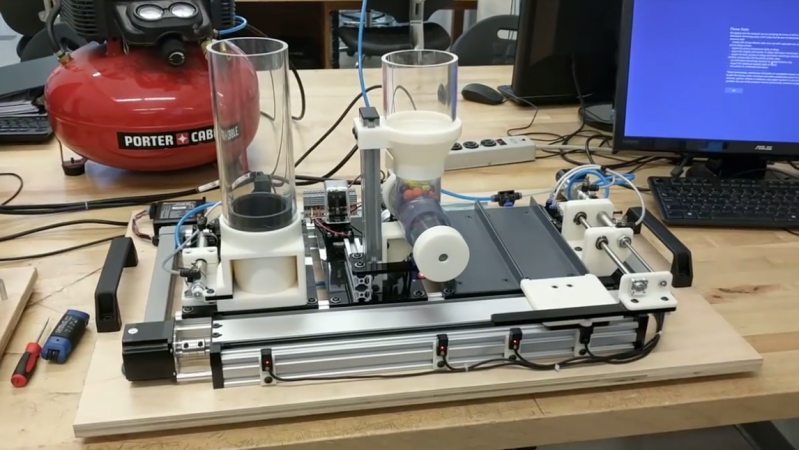A lot can be done with simple motors and linear motion when they are mated to the right mechanical design and control systems. Teaching these principles is the goal behind the LCMT (Low Cost Mechatronics Trainer) which is intended primarily as an educational tool. The LCMT takes a “learn by doing” approach to teach a variety of principles by creating a system that takes a cup from a hopper, fills it with candy from a dispenser, then sorts the cups based on color, all done by using the proper combinations of relatively simple systems.
The Low Cost Mechatronics Trainer can be built for under $1,000 and is the wonderful work of a team from the Anne Arundel Community College in Maryland, USA. The LCMT is clearly no one-off project; there are complete CAD files and build documentation on the site, as well as a complete lab guide for educators.
A demo video of the assembled system is embedded below, with a walkthrough done by [Tim Callinan]. It’s worth a watch to see how cleanly designed the system is, and the visual learners among you may learn a thing or two just by watching the system go through its motions.
If you like seeing mechanical subsystems come together to complete more complex tasks, [Brian Benchoff] wrote all about his robot burger experience, which if nothing else was certainly an exciting feat of automation.
[via OpenBuilds]
















niiice i want one ;)
I don’t call $1000 for a cup dispenser low cost.
Look on some educational websites and see what something like this costs pre-assembled and with curriculum.
Here is an example: https://www.festo.com/net/SupportPortal/Files/284261/MecLab%20Brochure%202013.pdf
for a measly $12,000. No PLC. This thing is a bargain!
The cost looks like it comes from using some industrial grade components. In the BOM, it looks like a lot of the electronics are from Automation Direct so that is were the expense comes from. Those parts aren’t necessary, since this build isn’t going to be running around the clock on a production line, but it seems to be a good way to introduce students to certain concepts with industrial parts they might see in the field.
This is a great trainer to be used as a mini capstone project in an automation certificate or degree. It uses industrial grade components and the lab manual gives students some real world experiences.